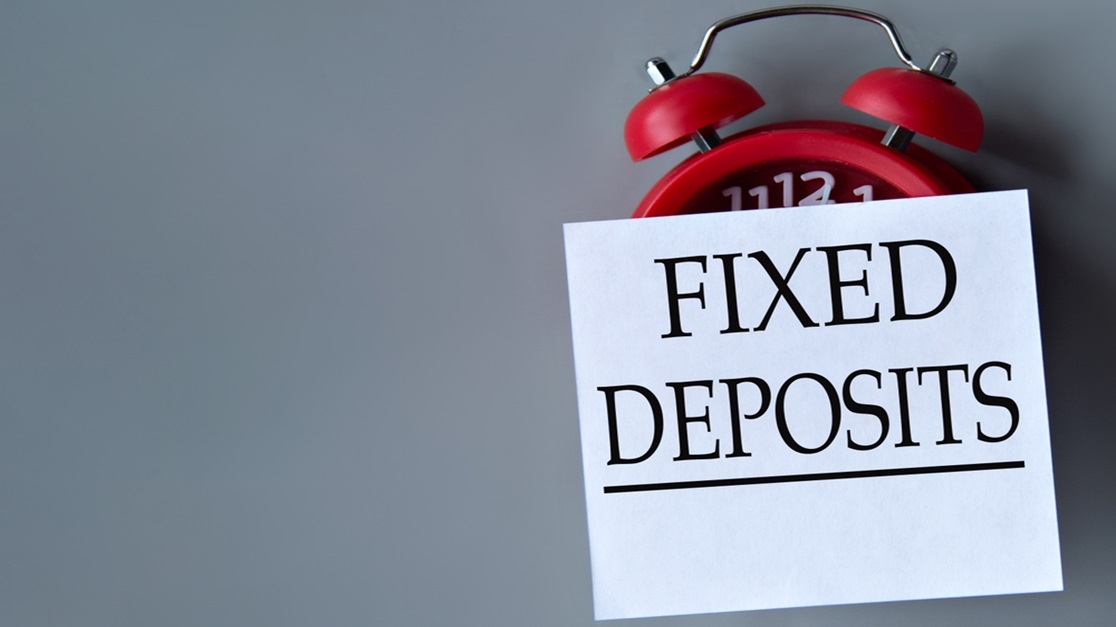Fixed Deposits for Funding Major Life Events
October 22, 2024

Whether it's buying a car or house, or going on a dream vacation, we'll have aspirations that we want to achieve. To make our aspirations a reality, we need to have our financial goals aligned. This is where Fixed Deposits (FDs) come to the picture. FDs offer a stable and reliable investment channel that can help you save and grow your wealth in the long term. So, if you're just starting out on your investment journey and planning to save for major life events, opening a Fixed Deposit account could be the best option.
In this blog, we have focused on the potential of FDs for meeting long- and short-term financial goals. Additionally, we have provided essential financial planning tips.
Best Financial Planning Tips for Major Life Events
Here are some critical steps to make the most out of your investments for significant life events.
Define Your Goals
Consider the specific events you anticipate in the coming years, such as buying a house, starting a family, or early retirement. Getting specific about your goals and estimating the costs involved is essential. For instance, if you want to purchase a house, research average prices for homes in your desired area or the expenses associated with your dream wedding or education. This would help you understand how much you need to save, at least for down payment, and how much home loan you would need. You may consider reading about the different types of home loans available in India for better understanding.
Assess Your Financial Situation
Once you've defined your goals, it's time to assess your financial situation. Take a close look at your monthly income and expenses to determine if this is an ideal time to save for major life events. Before you start saving, ensure you have an emergency fund in place. Aim to set aside three to six months' living expenses in a high-yield savings account. This will provide a financial safety net and prevent you from dipping into your savings.
Create a Budget
After assessing your financial situation, it's crucial to create a budget. Research the costs associated with your desired event, such as wedding expenses or a down payment for a house. Factor in every single cost to determine how much you need to save and for how long. Use online budgeting tools or apps to help you allocate your income and expenses effectively.
Start by allocating a portion of your income towards investment instruments like Fixed Deposits. Consistent saving over time can yield significant results, even if you can only set aside a small amount each month.
Start Investing in Fixed Deposits
Now that you have set your goals and created a budget, it's time to start financial planning for these life events. Fixed Deposits and Recurring Deposits are an excellent option for short-term savings, like funding major life events.
FDs provide fixed rate over a predetermined period. They are primarily used for capital preservation and stabilising your investment portfolio. Just so you know, Ujjivan SFB offers high-interest FDs ideal for growing your wealth in a safe and secure way.
There are several benefits of fixed deposits to fund major life events:
- Safe Investment: Fixed deposits provide guaranteed and safe returns. You don't have to worry about market volatility as you will earn the promised interest if you invest for the defined term.
- Flexible Tenure: You can customise the duration of your fixed deposit based on your needs. If you have planned a significant event in five years, you can keep a fixed deposit to cover your financial needs. FD tenure ranges from 7 days to 10 years.
- Liquidity: Fixed deposits are liquid assets that can be withdrawn early if necessary, although a penalty may be charged for early withdrawal. You can learn more about it here.
- Tax Benefits: Tax Saver Fixed Deposits offer tax benefits under Section 80C of the Income Tax Act. While the interest earned is taxable, you can claim a deduction of up to ₹1,50,000 for the amount invested. Please note that you can invest only up to ₹1.5 lakh in Tax Saver FDs. The lock-in period is 5 years.
- Loan and Overdraft Facility: Some banks offer loans against fixed deposits. You can borrow up to 90% of your principal and accrued interest as a loan against your FD. You can also opt for an overdraft against your FD. The interest is charged only on the drawn amount while the remaining FD continues to earn interest. Also, you don't have to pay back the amount in EMIs. Repay whenever you have funds. Just ensure to repay the amount before the maturity.
- Flexible Interest Pay-outs: When investing in fixed deposits, you can choose how often you want to receive the interest. You can opt for monthly, quarterly, semi-annual, annual, or at maturity interest payments. Additionally, you can reinvest the interest earned and benefit from compound interest.
Investment Example
Let's consider an example to understand how fixed deposits can help fund significant life events:
Rahul wants to buy a house in five years and estimates he needs ₹50 lakhs for the down payment. He decides to open a fixed deposit account with Ujjivan SFB with an interest rate of 8.25%. By investing ₹40 lakhs in the fixed deposit, he calculates that he will earn approximately ₹14 lakhs in interest over five years.
| Amount Invested (₹) | Interest Rate | Interest Earned (₹) |
| 40,00,000 | 8.25% | 16,50,000 |
By the end of five years, Rahul will have a total of ₹56.5 lakhs (₹40 lakhs + ₹16.5 lakhs) for his down payment.
Final Thoughts
In conclusion, funding major life events requires careful financial planning. By defining your goals, assessing your financial situation, creating a budget, and utilising savings strategies like fixed deposits, you can ensure a successful outcome for these events. With the stability and guaranteed returns offered by fixed deposits, you can save effectively and achieve your goals.
Looking to grow your savings faster? Ujjivan SFB offers a wide range of fixed deposit products. Select the FD of your choice and take a step forward to your financial goals. Alternatively, you can browse through Ujjivan SFB product suite - our wide range of financial products are designed to make your financial life better.
Disclaimer:
The contents herein are only for informational purposes and generic in nature. The content does not amount to an offer, invitation or solicitation of any kind to buy or sell, and are not intended to create any legal rights or obligations. This information is subject to updation, completion, amendment and verification without notice. The contents herein are also subject to other product-specific terms and conditions, as well as any applicable third-party terms and conditions, for which Ujjivan Small Finance Bank assumes no responsibility or liability.
Nothing contained herein is intended to constitute financial, investment, legal, tax, or any other professional advice or opinion. Please obtain professional advice before making investment or any other decisions. Any investment decisions that may be made by the you shall be at your own sole discretion, independent analysis and evaluation of the risks involved. The use of any information set out in this document is entirely at the user’s own risk. Ujjivan Small Finance Bank Limited makes no representation or warranty, express or implied, as to the accuracy and completeness for any information herein. The Bank disclaims any and all liability for any loss or damage (direct, indirect, consequential, or otherwise) incurred by you due to use of or due to investment, product application decisions made by you on the basis of the contents herein. While the information is prepared in good faith from sources deemed reliable (including public sources), the Bank disclaims any liability with respect to accuracy of information or any error or omission or any loss or damage incurred by anyone in reliance on the contents herein, in any manner whatsoever.
To know more about Ujjivan Small Finance Bank Products Visit:"https://www.ujjivansfb.in"
All intellectual property rights, including copyrights, trademarks, and other proprietary rights, pertaining to the content and materials displayed herein, belong
to Ujjivan Small Finance Bank Limited or its licensors. Unauthorised use or misuse of any intellectual property, or other content displayed herein is strictly prohibited and the same is not intended for distribution to, or use by, any person in any jurisdiction where such distribution or use would (by reason of that person’s nationality, residence or otherwise) be contrary to law or registration or would subject Ujjivan Small Finance Bank Limited or its affiliates to any licensing or registration requirements.
FAQs
1. How long should I keep a fixed deposit for?
The duration of a fixed deposit depends on your financial goals and needs. It can range from as short as one month to several years. If you're looking for higher returns, you should invest for the long-term
2. Can I withdraw my fixed deposit before the maturity period?
Yes, you can withdraw your fixed deposit before the maturity period, but a penalty may be charged for early withdrawal.
3. What happens to the interest earned on a fixed deposit?
The interest earned on a fixed deposit can be paid to you at regular intervals or reinvested into the fixed deposit to earn compound interest.
4. Are fixed deposits taxable?
Yes, the interest earned on fixed deposits is taxable. A TDS (Tax Deducted at Source) of 10% is applicable if your interest income exceeds ₹40,000 (₹50,000) for senior citizens in a financial year.
5. Are there any risks associated with fixed deposits?
Fixed deposits are considered safe investments, but there is a risk of inflation eroding the purchasing power of your returns over time.
6. Can I add more money to my existing fixed deposit account?
No, you cannot add more money once a fixed deposit account is opened. However, you can open another account if needed.
7. What minimum amount is required to open a fixed deposit account?
The minimum amount required to open a fixed deposit account varies depending on the bank or financial institution. It can range from as low as ₹1,000 to higher amounts.
8. Can I choose the frequency of interest payments on my fixed deposit?
Yes, you can choose the frequency of interest payments on your fixed deposit, such as monthly, quarterly, semi-annually, annually, or at maturity.
9. Are fixed deposits better than savings accounts for saving towards major life events?
Fixed deposits often offer higher interest rates compared to savings accounts, making them a favourable choice for saving towards major life events.
Latest Blogs

ITR-1 (Sahaj) Restrictions: Income Sources Not Allowed & Filing Rules
With just a few days left before the 15 September 2025 deadline for filing Income Tax Returns (ITRs) for Assessment Year (AY) 2025-26, many taxpayers are rushing to submit their forms online.

GST Rate Cut on Electronics: What It Means for Consumers and Retailers
India’s Goods and Services Tax (GST) system has entered a new era with the rollout of GST 2.0, effective from September 22, 2025.

Banking Safety Guide: How to Avoid QR Code Frauds While Making Payments
India’s love for QR code payments has made transactions lightning-fast, but also opened a new front for cybercriminals.

Scam Alert! Phishing, Vishing, and Smishing Can Drain Out Your Finances
Digital banking in India has transformed the way we manage money.

India’s New GST Reform Bill: What GST 2.0 Means for You
India’s indirect tax system is entering a landmark new phase.





